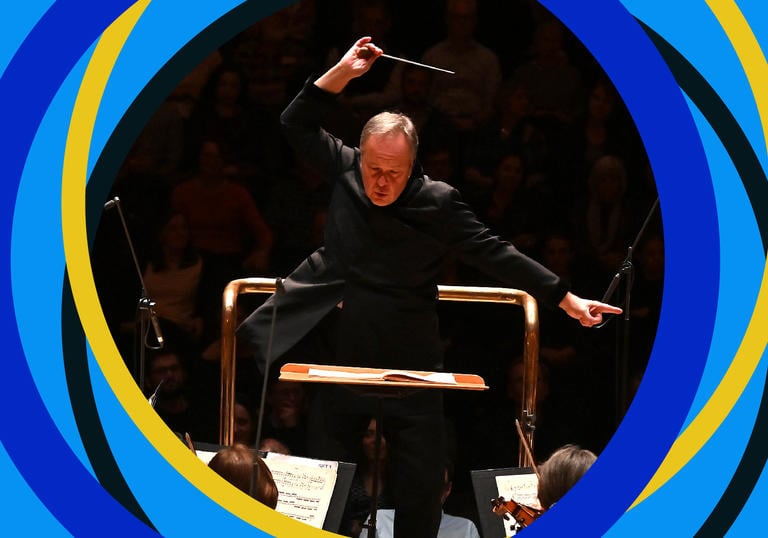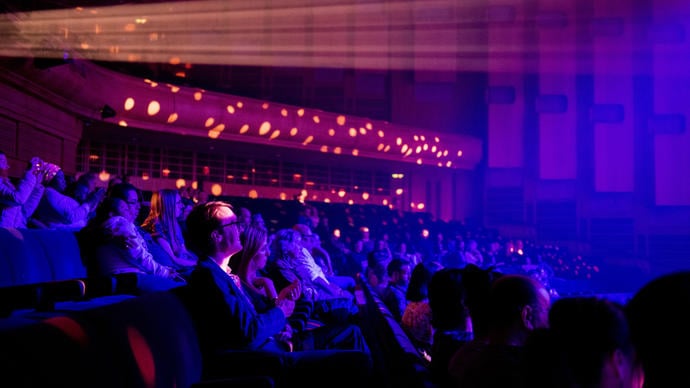Digital Programmes
BBC Symphony Orchestra: A New Dawn
Start time: 7.30pm
Approximate running time: 120 mins including a 20 minute interval
Please note all timings are approximate and subject to change.
This performance is subject to government guidelines

The BBC Symphony Orchestra with Chief Conductor Sakari Oramo reunite with a live audience in the Hall for the first time in 20 months, with a programme of Betsy Jolas, Ruth Gipps and Johannes Brahms.
Betsy Jolas grew up in Paris surrounded by artists: her parents ran a literary journal and guests included James Joyce, Gertrude Stein, Ernest Hemingway and Henri Matisse. Jolas observed their more eccentric foibles with characteristic wryness but, despite some early self-doubt, she knew that a career in the arts beckoned. By her teens Jolas was certain that she wanted to be a composer, and her voice developed during studies with Arthur Honegger, Darius Milhaud and Olivier Messiaen; she became Messiaen’s assistant at the Paris Conservatoire and was appointed to the faculty there in 1975.
By this time Jolas had spent years in both France and America. She embraced modernist techniques alongside Pierre Boulez at his ‘Domaine musical’ in the 1960s, but another key facet of her style stemmed from a different source entirely: Renaissance music. Jolas’s love of this repertoire started with a performance of Monteverdi given by Nadia Boulanger, and was consolidated while singing in the Dessoff Choirs during studies in New York and at Bennington College in Vermont. Jolas has gone on to teach in America at Yale, Harvard, Berkeley, UCLA, Mills College and Tanglewood, among others.
Letters from Bachville was commissioned by Gewandhausorchester Leipzig and the Boston Symphony. Leipzig, Johann Sebastian Bach’s town, prompted a piece centred on Jolas’s memories of Bach; ‘Bachville’ is a nod to similar American placenames. As Jolas writes, the work reflects ‘the great moments of my Bach memories, but also illustrates the way this music is so often heard today, boiled down to the opening notes of a few famous pieces, then hastily put together for both easy listening and instant interruption.’
Fragments of Bach pervade the piece, sometimes with their intervals altered, along with Jolas’s own passacaglia and Bach’s musical signature (B-flat, A, C, B-natural – ‘H’ in German notation). Yet this is not a piece ‘about’ Bach; it is personal to Jolas, who says of her compositional process: ‘I think the piece is finished when I recognise myself’.
While Betsy Jolas embraced the European avant-garde, Ruth Gipps forged her own path, veering away from overtly modernist tendencies in favour of a language that incorporates many of the traditions with which she grew up, yet is quite distinctive in quality. A highly versatile musician, Gipps entered the Royal College of Music to study oboe and piano, as well as composition with Gordon Jacob and Ralph Vaughan Williams. She was later successful as a conductor and music director.
Indeed, Gipps’s career was initially promising: her piano quartet won the Cobbett Prize; Sir Henry Wood featured her Knight in Armour at the 1942 Last Night of the Proms; her Second Symphony was performed in 1946 in Birmingham, where she worked variously as oboist, pianist and chorus master with the City of Birmingham Symphony Orchestra and Choir. Gipps and Sir Malcolm Arnold were mutual admirers who corresponded regularly. Yet Gipps faced misogynist discrimination elsewhere and struggled against modernist tides in the 1950s and 60s.
The fierceness with which she had to fight her corner sometimes led to a certain bitterness that in turn did not always endear her to her peers, and has at times hampered her reputation since.
Gipps’s Horn Concerto was composed for her son, Lance Baker, who gave its premiere in 1969 with Gipps conducting her own London Repertoire Orchestra. The work exploits the instrument’s lower register, and opens with a spacious, serene, sometimes Holstian movement in which the horn’s cadenza is substantial without being excessively showy. This irresistibly dreamy atmosphere returns in the livelier second movement, and again in the spirited finale during a duet for horn and celesta.
Brahms took about 21 years to write his First Symphony, but once this hurdle had been overcome he wrote the Second quite quickly. Brahms toyed with his publishers when describing the Symphony No. 2, writing (probably with tongue firmly in cheek) that the work ‘is so melancholy that you will not be able to bear it. I have never written anything so sad, and the score must come out in mourning’. The symphony was first performed on 30 December 1877 and was hailed by critic Eduard Hanslick as ‘a great, unqualified success’.
The lyrical opening melody dissolves into a darker sonority for trombones and timpani, although the melodic radiance of the movement ultimately prevails, including a theme introduced on violas and cellos based on ‘Brahms’s Lullaby’, a tune he had composed for his Wiegenlied (‘Lullaby’), Op. 49. The coda is unusual for a symphonic first movement, ending not with bombast but with gentleness.
The richly Romantic second movement begins with violas and cellos unfolding one of Brahms’s deliberately ambiguous creations, a theme in which a fluid sense of meter is enriched by a wealth of ideas that lend themselves to ‘developing variation’. This term was coined by Arnold Schoenberg, who wrote an essay called ‘Brahms the Progressive’ crediting Brahms with innovations including this technique, in which processes of variation and development are combined.
Brahms begins the pastoral third movement with an oboe theme supported by the winds, and with cellos playing pizzicato (plucked). The movement is in an unusual form, combining elements of the Scherzo and Trio pioneered by Ludwig van Beethoven with a more episodic rondo structure. Fleeting shadows pass across the finale, but hope wins, and the work ends in a glorious blaze of sunshine.
© Joanna Wyld
Co-produced by the Barbican and BBC Symphony Orchestra
Start time: 7.30pm
Approximate running time: 120 mins including a 20 minute interval
Please note all timings are approximate and subject to change.
This performance is subject to government guidelines
Programme and performers
Programme
Betsy Jolas Letters from Bachville
Ruth Gipps Horn Concerto
1. Con moto – Tranquillo – Cadenza
2. Scherzo: Allegretto
3. Finale: Allegro ritmico – Giocoso
Johannes Brahms Symphony No 2
1. Allegro non troppo
2. Adagio non troppo
3. Allegretto grazioso (quasi andantino)
4. Allegro con spirito
Performers
BBC Symphony Orchestra
Sakari Oramo conductor
Ben Goldscheider french horn
Artist biographies
The BBC SO has been at the heart of British musical life since it was founded in 1930. It plays a central role in the BBC Proms at the Royal Albert Hall, performing at the First and Last Night each year in addition to regular appearances throughout the Proms season with the world’s leading conductors and soloists.
The BBC SO performs an annual season of concerts at the Barbican in London where it is Associate Orchestra. Its commitment to contemporary music is demonstrated by a range of premieres each season, as well as Total Immersion days devoted to specific composers or themes.
In addition to frequent performances with Chief Conductor Sakari Oramo and Principal Guest Conductor Dalia Stasevska, the BBC SO works regularly with Semyon Bychkov, holder of the Günter Wand Conducting Chair, Conductor Laureate Sir Andrew Davis and Creative Artist in Association Jules Buckley.
The vast majority of performances are broadcast on BBC Radio 3 and a number of studio recordings each season are free to attend. These often feature up-and-coming new talent including members of BBC Radio 3’s New Generation Artists scheme. All broadcasts are available for 30 days on BBC Sounds and the BBC SO can also be seen on BBC TV and BBC iPlayer and heard on the BBC’s online archive, Experience Classical.
The BBC Symphony Orchestra and Chorus, alongside the BBC Concert Orchestra, BBC Singers and BBC Proms offer enjoyable and innovative education and community activities and take a leading role in the BBC Ten Pieces and BBC Young Composer programmes.
Sakari Oramo is Chief Conductor of the BBC Symphony Orchestra. A guest conductor at the highest international level and a prolific recording artist, his performances combine structural cohesion with authority, elegance and passionate delivery.
Guest engagements during the 2021/22 season include returns to the Berliner Philharmoniker, Wiener Symphoniker, Finnish Radio Symphony Orchestra, NDR Elbphilharmonie Orchester, and Tampere Philharmonic Orchestra.
Engagements in the past season have included his final concerts as Chief Conductor of the Royal Stockholm Philharmonic as well as guest appearances with the Finnish Radio Symphony Orchestra, Ostrobothnian Chamber Orchestra, Helsinki Philharmonic Orchestra and Berliner Philharmoniker.
The 2021-22 season will be his eighth with the BBC SO, with whom he continues to champion new and rarely performed works.
Recent recordings with the BBC SO include William Alwyn’s opera Miss Julie, Ethel Smyth’s Mass in D (plus the overture to her opera The Wreckers), orchestral works by Sibelius, Rachmaninov’s Piano Concertos Nos 2 and 3 with Yevgeny Sudbin and Florent Schmitt’s Symphony No 2 and Antoine et Cléopâtre suites.
Nominated by the Barbican as an ECHO Rising Star, during the 2021/22 season Ben gives recitals at major concert halls including the Concertgebouw, Musikverein, Elbphilharmonie and Koln Philharmonie, including an especially commissioned new work by Mark Simpson.
This autumn he makes his debut with the BBC Symphony Orchestra conducted by Sakari Oramo at the Barbican performing Ruth Gipps Concerto and in 2022 with the London Philharmonic Orchestra conducted by Ed Gardner at the Royal Festival Hall performing the Knussen Concerto.
In 2022 he returns to the Pierre Boulez Saal to give a solo recital and to Wigmore Hall with Mahan Esfahani, Nicholas Daniel and Adam Walker.
Highlights over the last year have included the release by Three Worlds Records of Legacy: A Tribute to Dennis Brain, and a solo concerto recording with the Philharmonia Orchestra to be released this autumn. He returned to Wigmore Hall and made his debut at the Aldeburgh Festival.
Ben is a member of the Pierre Boulez Ensemble and principal horn of the West- East Divan Orchestra. He was a prize-winner at the 2019 YCAT International Auditions and a BBC Young Musician Concerto Finalist in 2016.
Born in London, in 2020 Ben completed his studies with honours at the Barenboim-Said Academy in Berlin with Radek Baborák.
Our Patrons and supporters

Our Patrons and supporters
Find out about our Patrons, who help us keep our programme accessible to everyone and allow us to continue investing in the artists and communities we work with.
Love the arts? Become a Patron to engage more closely with our programme.
